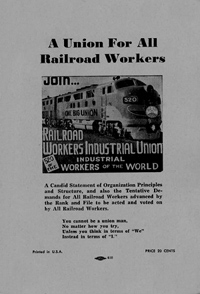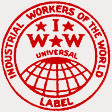A Union For All Railroad Workers
Transcribed by J. D. Crutchfield from an original kindly lent by FW Steve Kellerman, Boston GMB. Some misprints silently corrected. Reformatted slightly for easier reading.
Last updated 8 March 2004.
A Foreword About Those Who Wrote This Booklet
 This booklet, like the movement to organize railroad workers into the One Big Union of the I. W. W., comes from actively engaged railroad workers themselves. The authors do not make their living by writing or by organizing. For over thirty years each of them has made his living by working in the railroad industry. They were selected as a committee by their fellow workers who wanted the best possible working conditions and who realize they will need the best possible unionism to get them.
This booklet, like the movement to organize railroad workers into the One Big Union of the I. W. W., comes from actively engaged railroad workers themselves. The authors do not make their living by writing or by organizing. For over thirty years each of them has made his living by working in the railroad industry. They were selected as a committee by their fellow workers who wanted the best possible working conditions and who realize they will need the best possible unionism to get them.
For this reason they selected the I. W. W. because of its structure, policies, principles and its 43 years' clean record of no sell-outs, no crossing of picket lines, no scabbery and continuous working rank and file control.
They have made rapid progress. At the present time they have delegates in the following departments of railroad transportation: Engineers, Firemen, Conductors, Trainmen, Car Inspectors, Dispatchers, Switchmen, Signal Operators. Not one of these is drawing pay from the union for his work. They give the necessary hours to their boss on the job and the other hours are devoted to rest and organization activity. This shows their sincerity and determination. Every delegate has years of experience in railroad transportation and in the more than twenty unions that keep railroad workers divided. It is their firm determination to organize all who work for the railroads.
In making this booklet to explain why they want industrial unionism, and what they hope to accomplish with it, they have picked up whatever good idea they could find anywhere, without concerning themselves with crediting the originator, certain that a good idea should be circulated.
They propose Tentative Demands. They are tentative because a democratic organization does not get its demands shoved down its throat. It is not enough to re-organize railroad labor industrially. An industrial union with the policies of the present craft-union leadership, while it might be better than craft unionism, is not good enough. The men who have sat up nights to prepare this booklet want you to read it, to think about it, and circulate it.
LISTEN, RAILS!
Every click of the rails is singing to you,
"Get more, get more, get more !"
Every exhaust of every engine is saying,
"You can do it, you can do it, you can do it !"
And the deep-throated wampus says:
"Organize, Organize, Organ-i-i-ze!"